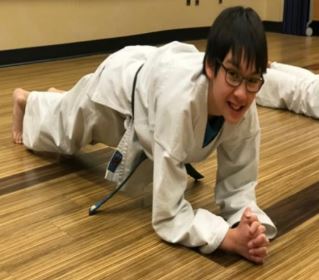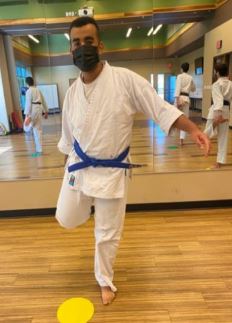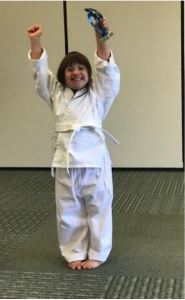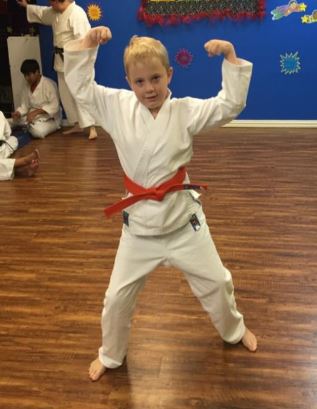Importance of exercise and how karate builds self-confidence. Benefits of Karate.
As the school year begins, parents of children with disabilities coordinate their busy schedule of therapies and school along with enrolling them in a sport and recreational activities. What is sought after is an activity that offers both meaningful movement and therapeutic benefits. Unfortunately, options are limited in recreational activities for individuals with disabilities compared to their typical peers.
One good option for meaningful, consistent activity with therapeutic benefits is karate. There are many physical and therapeutic benefits of practicing karate. Usually, therapeutic goals for individuals with special needs & disabilities focus on improving postural control, improving balance, improving motor control, improving attention, decreasing impulsivity, & increasing processing & organizational skills.

Karate is a great and fun extension of physical and occupational therapy. Often individuals with intellectual and developmental differences are seen only once a week by a Physical Therapist, and I strongly believe that the addition of a karate class can greatly assist with reaching goals in the above areas. A karate class is often a place where individuals special needs and disabilities can excel due to its consistency. If done correctly, the students also have fun. An important part of karate practice is focus on kata practice (sequential moves). Kata practice creates familiarity due to its repetition, which reduces anxiety and provides comfort due to clear expectations.

Another benefit of karate practice is focus on core strength and in general building physical strength. Which is extremely important for individuals with special needs and disabilities as often they struggle with hypotonia, which is muscle weakness affecting how they use their muscles for joint stability, posture, coordination, and balance. Adaptive karate done well focuses on core strength. Strengthening these muscles is of key importance and is done directly through punching, kicking, stances, standing on one leg, and katas but also through exercises done in class. Exercises to work these important muscles are abdominal exercises, planks, push-ups and others. Balance and coordination are large topics that karate works well on with its many stances and movements, and its work on trunk or core strength is a huge benefit we may not initially think of.

Karate also helps with improving the child’s ability to follow multi-step tasks. Often a child may have difficulty with keeping focus and attention and being able to do more than two or three steps in an activity. Karate provides a good environment and wonderful tool with kata (sequential moves) training to improve this. As mentioned earlier, it is a good environment and with the series of movements found in kata they can progress to 20+ steps. Kata and general practice in karate is also helpful in improving gross motor control (big general movements) leading to fine motor control (more sophisticated coordination). This is how we all generally learn in karate. Initially our movements and our katas have the basic movements but with time and repetition, we continue to fine tune and work on the smaller movements.
The big picture I would like to emphasize is all the issues mentioned above sets karate students up for improved function in all the aspects of life as they grow and as adults. Improving these deficits will help them perform and engage in school and the community at large. Karate is is not just punching and kicking but having an environment that allows achievement and improving self-confidence.

Moreover, intrinsic karate value of respect enhances students’ social interaction. Each karate class begins and ends with a bow to show respect. The act of bowing reminds students to be respectful not only during the karate class, but also in other areas of their functioning. Often students are asked to give examples of how they can show respect at home, school, etc. Showing respect and following directions are fundamental values that karate class reinforces.
Finally, karate’s system of belt promotions creates challenge to learn new skills and sets up the students for success as they achieve new belt levels. Through hard work, focus and consistency in learning new karate skills and achieving higher belt levels, students develop a sense of knowing, ability, and confidence amid the disability they deal with. Karate practice offers the experience of ability as students learn new skills and overcome the challenges they face. Ultimately, karate practice builds self-confidence and cultivates the attitude of ability and the desire to grow and be successful not only in karate but in other areas of their lives.
Full Article:
Article By Sensei Witek Nowosiad

